Kate Leibfried's Blog, page 9
January 9, 2014
5 Essential Editing Tips
I promised a set of editing tips in my last blog, and now here they (finally) are! But first, an update:
I spent the last few weeks (yes, over the holidays. A writer never rests!) picking apart my 146,000 word manuscript and attempting to reduce it to just under 120,000 words. Two days ago, my mission was accomplished! Final count: 119,972. Now that my manuscript is under 120K words, it is frankly more marketable. The industry standard today is between 80-120K words, especially if you are a new, unestablished author.
What steps did I take to axe over 25,000 words (or 60 pages) from my manuscript? These, mainly:
 1. Take a step away from your work.
1. Take a step away from your work.
This may seem counterintuitive, but this is an important first step. If you are too close to your manuscript, you won't see the big picture. Spend some time away from it and focus on other things for a while. For example, I finished my story last spring, revised it a bit in the summer, and did my serious edits this winter. You might not have to wait so long, but this timeline worked for me.
The reason distance is important is because you need to read your work with fresh eyes. Distance allows you to read your story in a more detached and unbiased way, as if you are a third party who has just picked your book off the shelf.
Distance also allows you to become less attached to specific words/phrases/scenes/characters. If you're too close to your "darlings" it is hard to give them the axe.
2. Remember the difference between editing and proofreading.
This may not seem like a step at all, but it is actually the step. When you're editing your work (at least for the first couple of sweeps), do NOT focus on the little things. Editing is about evaluating the flow of the book--the big picture. This is your chance to look at the content, characters, structure (or flow), subplots, etc. You'll have time to go over minute details later in the proofreading stage (grammar, phrasing, word choice, and the like).
Ask yourself, "Does this section really aid the plot? Does it really serve to keep the story moving?" If not, get rid of it. It's fluff.
One of the tough decisions I had to make was whether or not to develop certain characters. In my first draft, I gave voices and inner dialogues to almost all characters, indiscriminately. In my subsequent drafts, however, I was more selective. I chose to emphasize certain characters more than others, thus eliminating several monologues and entire scenes with B-string characters. The result: the story now focuses on my major players and the reader's emotions are not spread too thin over many personalities and voices.
3. Use the Active Voice (when you should)
Unlike some editors, I believe there is a time and a place for the passive voice. Sometimes it makes sense to say "Sam had picked blueberries" instead of "Sam picked blueberries." The difference? "Sam had picked" implies that this is something Sam did often in the past, but no longer does. "Sam picked" implies that Sam picked blueberries once, and I'm telling you about that one time.
That said, it is important to use the active voice whenever it makes sense to do so. The active voice gives movement to your writing and helps quicken its pace. It can also help you focus on clarity. Do you really need to describe that scene with so many passive sentences? Won't one active sentence sum it up nicely?
4. Read slowly, re-read
Don't expect editing to be a quick process. It's not. At times, I have toiled over two pages for over an hour.
Keeping in mind the tedium of editing, set a schedule for yourself and stick to it. Set aside, say, two hours every day to work on editing and keep at it! This is about running a quality marathon, not zig-zagging through alleys and side-streets to arrive hastily at the finish line.
Take the time to go over each section more than once. Do one sweep, cut some unnecessary sentences or tighten up some thoughts, then go over it again. When I did my second sweeps, I usually ended up cutting a few more sentences (or even paragraphs) that did nothing to further my plot.
Think of yourself as a surgeon. When you're going over your story, take the time to determine if you really want to remove the spleen, or just the fingernails of a certain section. Again, constantly ask yourself how this or that scene is relevant to the overarching plot.
 5. Be Brave!
5. Be Brave!
You lovingly crafted your words; you spent hours developing your characters' interactions and inner dialogues; you are really, quite attached to that metaphor you created on page 82.
Sorry, editing is not for softies. If you truly want to do a good job at editing your own work, then you'll have to approach your story with a practical and fearless attitude, not an emotional one. A surgeon does not hesitate when she is removing your appendix. She realizes this organ does nothing for the body as a whole and it needs to be eliminated.
Go boldly into your manuscript and hack what needs to be hacked.
Bonus Tip: Keep a copy of your original work.
If you keep your original manuscript, you will be free to chop and slice and rework your manuscript without fear of losing something vital. If you change your mind after the chopping/slicing/reworking is complete, you can always revert back to the original.
Best of luck! Let me know how it goes.
-Kate
I spent the last few weeks (yes, over the holidays. A writer never rests!) picking apart my 146,000 word manuscript and attempting to reduce it to just under 120,000 words. Two days ago, my mission was accomplished! Final count: 119,972. Now that my manuscript is under 120K words, it is frankly more marketable. The industry standard today is between 80-120K words, especially if you are a new, unestablished author.
What steps did I take to axe over 25,000 words (or 60 pages) from my manuscript? These, mainly:
 1. Take a step away from your work.
1. Take a step away from your work.This may seem counterintuitive, but this is an important first step. If you are too close to your manuscript, you won't see the big picture. Spend some time away from it and focus on other things for a while. For example, I finished my story last spring, revised it a bit in the summer, and did my serious edits this winter. You might not have to wait so long, but this timeline worked for me.
The reason distance is important is because you need to read your work with fresh eyes. Distance allows you to read your story in a more detached and unbiased way, as if you are a third party who has just picked your book off the shelf.
Distance also allows you to become less attached to specific words/phrases/scenes/characters. If you're too close to your "darlings" it is hard to give them the axe.
2. Remember the difference between editing and proofreading.
This may not seem like a step at all, but it is actually the step. When you're editing your work (at least for the first couple of sweeps), do NOT focus on the little things. Editing is about evaluating the flow of the book--the big picture. This is your chance to look at the content, characters, structure (or flow), subplots, etc. You'll have time to go over minute details later in the proofreading stage (grammar, phrasing, word choice, and the like).
Ask yourself, "Does this section really aid the plot? Does it really serve to keep the story moving?" If not, get rid of it. It's fluff.
One of the tough decisions I had to make was whether or not to develop certain characters. In my first draft, I gave voices and inner dialogues to almost all characters, indiscriminately. In my subsequent drafts, however, I was more selective. I chose to emphasize certain characters more than others, thus eliminating several monologues and entire scenes with B-string characters. The result: the story now focuses on my major players and the reader's emotions are not spread too thin over many personalities and voices.
3. Use the Active Voice (when you should)
Unlike some editors, I believe there is a time and a place for the passive voice. Sometimes it makes sense to say "Sam had picked blueberries" instead of "Sam picked blueberries." The difference? "Sam had picked" implies that this is something Sam did often in the past, but no longer does. "Sam picked" implies that Sam picked blueberries once, and I'm telling you about that one time.
That said, it is important to use the active voice whenever it makes sense to do so. The active voice gives movement to your writing and helps quicken its pace. It can also help you focus on clarity. Do you really need to describe that scene with so many passive sentences? Won't one active sentence sum it up nicely?
4. Read slowly, re-read
Don't expect editing to be a quick process. It's not. At times, I have toiled over two pages for over an hour.
Keeping in mind the tedium of editing, set a schedule for yourself and stick to it. Set aside, say, two hours every day to work on editing and keep at it! This is about running a quality marathon, not zig-zagging through alleys and side-streets to arrive hastily at the finish line.
Take the time to go over each section more than once. Do one sweep, cut some unnecessary sentences or tighten up some thoughts, then go over it again. When I did my second sweeps, I usually ended up cutting a few more sentences (or even paragraphs) that did nothing to further my plot.
Think of yourself as a surgeon. When you're going over your story, take the time to determine if you really want to remove the spleen, or just the fingernails of a certain section. Again, constantly ask yourself how this or that scene is relevant to the overarching plot.
 5. Be Brave!
5. Be Brave!You lovingly crafted your words; you spent hours developing your characters' interactions and inner dialogues; you are really, quite attached to that metaphor you created on page 82.
Sorry, editing is not for softies. If you truly want to do a good job at editing your own work, then you'll have to approach your story with a practical and fearless attitude, not an emotional one. A surgeon does not hesitate when she is removing your appendix. She realizes this organ does nothing for the body as a whole and it needs to be eliminated.
Go boldly into your manuscript and hack what needs to be hacked.
Bonus Tip: Keep a copy of your original work.
If you keep your original manuscript, you will be free to chop and slice and rework your manuscript without fear of losing something vital. If you change your mind after the chopping/slicing/reworking is complete, you can always revert back to the original.
Best of luck! Let me know how it goes.
-Kate
Published on January 09, 2014 09:46
December 15, 2013
Killing Your Darlings
 via Inktank.fiThe editing process is one of the most painful parts of being a writer. You've labored for months (or years) writing your manuscript; you've developed characters and subplots; you've become attached to certain metaphors and phrases. Now, it's time to ruthlessly read over your lovingly constructed sentences and hack them to bits. Good luck.
via Inktank.fiThe editing process is one of the most painful parts of being a writer. You've labored for months (or years) writing your manuscript; you've developed characters and subplots; you've become attached to certain metaphors and phrases. Now, it's time to ruthlessly read over your lovingly constructed sentences and hack them to bits. Good luck.Although it's painful to remove or change your work, it is absolutely necessary. No book is perfect after a first draft and it may take five or ten revisions to get it just right. After I finished writing Elmer Left, I thought, "This is absolutely perfect! It's ready for the presses. I'll just spend a week or two editing it and then, bam! It'll be good to go." Eight months later, I was still putting the final touches on my editing. One year later, I gave it another edit and submitted a second edition.
Additionally, I thought that I could do all the editing for Elmer Left by myself. Again, not true. I found that I was much too close to the manuscript (having labored over it for a year and nine months) and was reluctant to change or remove parts of it. Enter Jolene.
I solicited the help of Jolene, a friend with editing and writing experience who was willing to help me shape up my manuscript. She read and edited about a third of it before our first meeting and I was horrified when I saw all the red ink scrawled across the pages. Her suggestions were great, but some of them were major. I knew that I had a ton of work ahead of me if I wanted to really tighten my manuscript and strengthen the plot. When Jolene noticed my trepidation, she said something that I'll never forget: "I know it's difficult to chop up your manuscript and eliminate parts of it that you've grown to love, but sometimes you have to kill your darlings."
Well said.
That's exactly what you have to do when faced with a big edit or rewrite: kill your darlings. Murder the phrases you've come to love. Disembowel the characters who got a little too long-winded. Behead the subplots that went nowhere.
It's painful, but no one ever claimed that a writer's job is easy. It takes a lot of courage to slice your baby to bits and put her back together again, but in the end, it's absolutely worth it. Your plot and characters will become stronger; your sentences will be better-crafted and to the point. No fluff or tedium.
Right now, I am faced with the monumental task of whittling a 145,000 word work down to 120,000 words (via the advice of a prospective agent). Cutting 25,000 words means eliminating approximately 60 pages of darlings and I am certainly not looking forward to the task.
How will I do it? Stay tuned next week for some advice on how to effectively edit your work. In the meantime, I'll let you in on a secret: no amount of tricks or tips are any good without a large chunk of motivation and a steadfast belief in your writing. Writers: hang in there!
Published on December 15, 2013 16:06
November 24, 2013
Folding Rejection into Cranes
Last week, I received my first ever rejection letter from a prospective agent. For many writers, receiving rejections is depressing, sobering, and something you keep quietly to yourself. I decided to tell the interwebs...
Rejection is a big part of the road to traditional publishing. Almost every major author has gone through it, even greats like George Orwell, J.K. Rowling, and Joseph Heller. Stephen King received this comment for his book Carrie: "We are not interested in science fiction which deals with negative utopias. They do not sell." William Golding (author of Lord of the Flies) was rejected by multiple publishers. One called his book "an absurd and uninteresting fantasy which was rubbish and dull."
Ouch.
It just goes to show you that agents (who represent authors and act as a bridge between author and publishing company) and publishing companies don't always get it right. They don't have a crystal ball. They don't know if werewolves or time travel or talking, soccer-playing dogs will be popular next year. They only have their personal tastes and a general idea about what the market currently wants.
With this in mind, I began reaching out to literary agents last week. I composed a query letter (which I edited and rewrote countless times. More on that sometime), researched agents who are interested in my particular genre, and started sending out emails with my query letter and partial manuscript included.
To date, I have received three rejections. Two personal, one form letter.
I am not terribly wounded, but each rejection is a little nibble at my confidence. Each rejection weighs on my mind and shakes my confidence just a bit. I am far from throwing in the towel, but I decided to do something about these negative replies before they make me question my ability as a writer (I'm not certain I have the same tenacity as Jack London (author of White Fang and Call of the Wild), who was rejected nearly 600 times before finding a publisher!).
I decided to take each rejection and make something beautiful and ephemeral. I decided to make paper cranes...
...and paper dogs and helmets and whatever other origami creatures I decide to craft. I bought a 300 pack of origami paper (and prayed I wouldn't go through it all) and began folding. For my first rejection: a blue crane. For my second rejection: a pink dog head. For my third rejection: an orange helmet (which Dobby decided to chew to bits, which was satisfying in a smug kind of way).
So, here I am, telling anyone who wants to listen about my road blocks to publishing. My hope is that my recent lack of success will embolden you to also take your troubles and rejections and create something beautiful or perform a deliberate action in honor of your rejection. Plant a flower; bake a cake; glue a piece of colored glass onto a jar (as a kind of mosaic of troubles); build something; paint something; take an extra yoga class; go hiking. Take that rejection, turn it into something else, and show it that you're not afraid of it. You will conquer it in the end.
Trust me, it just makes you feel better.
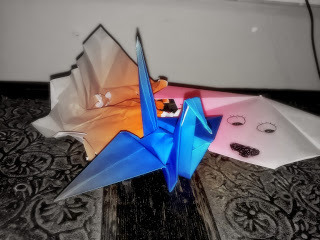
Rejection is a big part of the road to traditional publishing. Almost every major author has gone through it, even greats like George Orwell, J.K. Rowling, and Joseph Heller. Stephen King received this comment for his book Carrie: "We are not interested in science fiction which deals with negative utopias. They do not sell." William Golding (author of Lord of the Flies) was rejected by multiple publishers. One called his book "an absurd and uninteresting fantasy which was rubbish and dull."
Ouch.
It just goes to show you that agents (who represent authors and act as a bridge between author and publishing company) and publishing companies don't always get it right. They don't have a crystal ball. They don't know if werewolves or time travel or talking, soccer-playing dogs will be popular next year. They only have their personal tastes and a general idea about what the market currently wants.
With this in mind, I began reaching out to literary agents last week. I composed a query letter (which I edited and rewrote countless times. More on that sometime), researched agents who are interested in my particular genre, and started sending out emails with my query letter and partial manuscript included.
To date, I have received three rejections. Two personal, one form letter.
I am not terribly wounded, but each rejection is a little nibble at my confidence. Each rejection weighs on my mind and shakes my confidence just a bit. I am far from throwing in the towel, but I decided to do something about these negative replies before they make me question my ability as a writer (I'm not certain I have the same tenacity as Jack London (author of White Fang and Call of the Wild), who was rejected nearly 600 times before finding a publisher!).
I decided to take each rejection and make something beautiful and ephemeral. I decided to make paper cranes...
...and paper dogs and helmets and whatever other origami creatures I decide to craft. I bought a 300 pack of origami paper (and prayed I wouldn't go through it all) and began folding. For my first rejection: a blue crane. For my second rejection: a pink dog head. For my third rejection: an orange helmet (which Dobby decided to chew to bits, which was satisfying in a smug kind of way).
So, here I am, telling anyone who wants to listen about my road blocks to publishing. My hope is that my recent lack of success will embolden you to also take your troubles and rejections and create something beautiful or perform a deliberate action in honor of your rejection. Plant a flower; bake a cake; glue a piece of colored glass onto a jar (as a kind of mosaic of troubles); build something; paint something; take an extra yoga class; go hiking. Take that rejection, turn it into something else, and show it that you're not afraid of it. You will conquer it in the end.
Trust me, it just makes you feel better.

Published on November 24, 2013 17:06
October 22, 2013
Dobby the Dog Comes to America (My Debut Children's Book?)
My mom says this would make a good children's story. What do you think? Does it have potential? (Let me know in a comment!)
 Dobby's first week in the U.S.Meet Dobby. Dobby is from a small island in the archipelago of Bocas del Toro, Panama. I met this shy pup on my first day on the island--a place where I lived for six months while working on an alternative energy project. I was one of many interns who were working on various projects for an American company that was building luxury condos (there's way more to that story if you'd like to hear about it sometime!)
Dobby's first week in the U.S.Meet Dobby. Dobby is from a small island in the archipelago of Bocas del Toro, Panama. I met this shy pup on my first day on the island--a place where I lived for six months while working on an alternative energy project. I was one of many interns who were working on various projects for an American company that was building luxury condos (there's way more to that story if you'd like to hear about it sometime!)
When I first met Dobby he was skinny, tick-ridden, and terrified of humans. He might grab a piece of food out of my hand before darting away, but that was about as much interaction as he would risk. Unfortunately, Panamanians are not especially nice to dogs and consider them pests more than anything. The children were particularly cruel, throwing rocks at Dobby or pulling his tail.
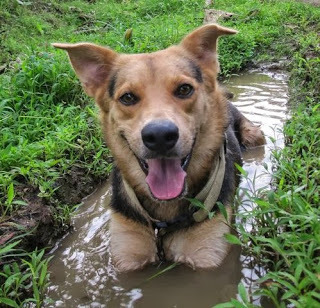 Dobby in PanamaHowever, after a few weeks, Dobby began to trust the interns and me little by little. He would take food from our hands, allow us to pet him, and eventually ventured up the stairs to sit in the balcony and lounge by our air conditioned rooms (since this time, he has become an expert lounger!). For some reason, Dobby became particularly attached to me. He would follow me into the woods when I hiked around or into the ocean when I swam. More than once, I had to scoop him into my arms and haul him back to shore when he got scared of the waves.
Dobby in PanamaHowever, after a few weeks, Dobby began to trust the interns and me little by little. He would take food from our hands, allow us to pet him, and eventually ventured up the stairs to sit in the balcony and lounge by our air conditioned rooms (since this time, he has become an expert lounger!). For some reason, Dobby became particularly attached to me. He would follow me into the woods when I hiked around or into the ocean when I swam. More than once, I had to scoop him into my arms and haul him back to shore when he got scared of the waves.
Life was never dull on the island. When Dob and I went for hikes, we would encounter everything from iguanas to capuchin monkeys to sloths to an anteater. Dobby was my constant companion and the most loyal little dog anyone could ask for. He even jumped into the water and started swimming after me when I left for a trip to Guatemala. I had taken the same boat into town nearly every day, but Dobby knew something was different this time. He saw my packed bags and somehow knew I was leaving for a long period of time. When the boat rounded the bend, my last glimpse was of Dobby frantically paddling toward me. I nearly cried.
When I returned from my trip, one of the first things I did was look for Dobby. I didn't have to search long. As soon as he heard my voice, he jetted toward me and jumped up to greet me. And life resumed on our little island....
 Dobby at Polo BeachAnd then it was almost time for me to go. Despite how sweet my little friend was, I did not intend to take him back with me to the United States. However, the owner of the luxury condo project declared one day (about two weeks before I was scheduled to leave) that he was going to round up all the stray dogs and ship them off to a tiny island nearby and leave them there to starve. He was about to host an important meeting on the island, he said, and couldn't have stray dogs wandering around.
Dobby at Polo BeachAnd then it was almost time for me to go. Despite how sweet my little friend was, I did not intend to take him back with me to the United States. However, the owner of the luxury condo project declared one day (about two weeks before I was scheduled to leave) that he was going to round up all the stray dogs and ship them off to a tiny island nearby and leave them there to starve. He was about to host an important meeting on the island, he said, and couldn't have stray dogs wandering around.
I was devastated. I held Dobby in my arms that night and sobbed, trying to figure out what to do. Fortunately, I had a few very good friends who were just as outraged as I was and willing to help me get Dobby back to the U.S.
So, to make a long story a little shorter, I left money with my friends Julie and Katie so they could get him the four rounds of shots he needed to come to the U.S. (the vet came to our island via a 45 minute bus ride and two 20 minute boat rides. The first round of shots cost all of $20.). Then, I had to wait six months for the weather to cool down so Dobby could fly to the U.S. with Julie's dad.
During this time, I hardly dared to hope that Dobby would actually make it to the states. It seemed too improbable; too many things could go wrong. However, one October day, three years ago, I drove down to Dallas, TX (with my amazingly understanding parents) and met my little guy at the airport. As soon as he heard my voice, he started pawing at his crate. And that was the start of our adventures together in the U.S.
I couldn't ask for a better friend.
Before and after:
 ...not anymore!
...not anymore!
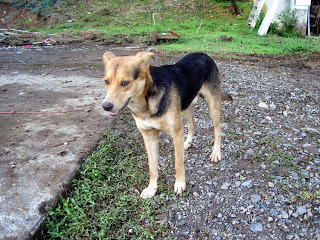 Dobby was pretty thin when I met him...
Dobby was pretty thin when I met him...
So, what do you think? Worthy of a children's book? Should it be in both Spanish and English? Weigh in!
Thank you,
Kate
 Dobby's first week in the U.S.Meet Dobby. Dobby is from a small island in the archipelago of Bocas del Toro, Panama. I met this shy pup on my first day on the island--a place where I lived for six months while working on an alternative energy project. I was one of many interns who were working on various projects for an American company that was building luxury condos (there's way more to that story if you'd like to hear about it sometime!)
Dobby's first week in the U.S.Meet Dobby. Dobby is from a small island in the archipelago of Bocas del Toro, Panama. I met this shy pup on my first day on the island--a place where I lived for six months while working on an alternative energy project. I was one of many interns who were working on various projects for an American company that was building luxury condos (there's way more to that story if you'd like to hear about it sometime!)When I first met Dobby he was skinny, tick-ridden, and terrified of humans. He might grab a piece of food out of my hand before darting away, but that was about as much interaction as he would risk. Unfortunately, Panamanians are not especially nice to dogs and consider them pests more than anything. The children were particularly cruel, throwing rocks at Dobby or pulling his tail.
 Dobby in PanamaHowever, after a few weeks, Dobby began to trust the interns and me little by little. He would take food from our hands, allow us to pet him, and eventually ventured up the stairs to sit in the balcony and lounge by our air conditioned rooms (since this time, he has become an expert lounger!). For some reason, Dobby became particularly attached to me. He would follow me into the woods when I hiked around or into the ocean when I swam. More than once, I had to scoop him into my arms and haul him back to shore when he got scared of the waves.
Dobby in PanamaHowever, after a few weeks, Dobby began to trust the interns and me little by little. He would take food from our hands, allow us to pet him, and eventually ventured up the stairs to sit in the balcony and lounge by our air conditioned rooms (since this time, he has become an expert lounger!). For some reason, Dobby became particularly attached to me. He would follow me into the woods when I hiked around or into the ocean when I swam. More than once, I had to scoop him into my arms and haul him back to shore when he got scared of the waves.Life was never dull on the island. When Dob and I went for hikes, we would encounter everything from iguanas to capuchin monkeys to sloths to an anteater. Dobby was my constant companion and the most loyal little dog anyone could ask for. He even jumped into the water and started swimming after me when I left for a trip to Guatemala. I had taken the same boat into town nearly every day, but Dobby knew something was different this time. He saw my packed bags and somehow knew I was leaving for a long period of time. When the boat rounded the bend, my last glimpse was of Dobby frantically paddling toward me. I nearly cried.
When I returned from my trip, one of the first things I did was look for Dobby. I didn't have to search long. As soon as he heard my voice, he jetted toward me and jumped up to greet me. And life resumed on our little island....
 Dobby at Polo BeachAnd then it was almost time for me to go. Despite how sweet my little friend was, I did not intend to take him back with me to the United States. However, the owner of the luxury condo project declared one day (about two weeks before I was scheduled to leave) that he was going to round up all the stray dogs and ship them off to a tiny island nearby and leave them there to starve. He was about to host an important meeting on the island, he said, and couldn't have stray dogs wandering around.
Dobby at Polo BeachAnd then it was almost time for me to go. Despite how sweet my little friend was, I did not intend to take him back with me to the United States. However, the owner of the luxury condo project declared one day (about two weeks before I was scheduled to leave) that he was going to round up all the stray dogs and ship them off to a tiny island nearby and leave them there to starve. He was about to host an important meeting on the island, he said, and couldn't have stray dogs wandering around.I was devastated. I held Dobby in my arms that night and sobbed, trying to figure out what to do. Fortunately, I had a few very good friends who were just as outraged as I was and willing to help me get Dobby back to the U.S.
So, to make a long story a little shorter, I left money with my friends Julie and Katie so they could get him the four rounds of shots he needed to come to the U.S. (the vet came to our island via a 45 minute bus ride and two 20 minute boat rides. The first round of shots cost all of $20.). Then, I had to wait six months for the weather to cool down so Dobby could fly to the U.S. with Julie's dad.
During this time, I hardly dared to hope that Dobby would actually make it to the states. It seemed too improbable; too many things could go wrong. However, one October day, three years ago, I drove down to Dallas, TX (with my amazingly understanding parents) and met my little guy at the airport. As soon as he heard my voice, he started pawing at his crate. And that was the start of our adventures together in the U.S.
I couldn't ask for a better friend.
Before and after:
 ...not anymore!
...not anymore! Dobby was pretty thin when I met him...
Dobby was pretty thin when I met him...So, what do you think? Worthy of a children's book? Should it be in both Spanish and English? Weigh in!
Thank you,
Kate
Published on October 22, 2013 21:04
October 17, 2013
On Ben Cooper and Beginnings
My week is bookended by two weddings. Two beginnings. Two profoundly meaningful days for two sets of couples. And for me? My own profound day fell right in the middle.
Yesterday, I had the privilege to finally meet the inspiration for my second novel: Ben Cooper. After a stunning and unique show (and a surprise yo-yo display by the drummer...apparently he was ranked 3rd best yo-yoer in the world at one point), I finally met the man behind the magic lyrics. I was not disappointed.
Ben was gracious and humble when I handed over my 300 page manuscript. I honestly think he was blown away that I actually came through with my idea (which I pitched to him two years ago), and was able to hand him something tangible. Then came the surprise:
"I wanted to be a writer too, at one point," Ben told me. "I actually wrote 150 pages of something and then my computer crashed and I lost it all. Then I decided to stick with being a musician!"
 Taken by Charles Robinson, 10.16.13
Taken by Charles Robinson, 10.16.13
I smiled. When I thought about what he'd said later, it made complete sense. His lyrics are thick and rich; they tell stories within stories (and this is not accidental, as he explained during his show). There is a lot of thought and soul that goes into his music--not just a nice beat or a few well-put together riffs. It is not a stretch to grasp his lyrics and turn them into something longer, something like Ten Thousand Lines.
As my two dear friends begin their new lives with their new husbands, I think about my special day sandwiched in the middle. It was also a beginning. It was the first time I placed the manuscript of my new book in the hands of another person. Here's hoping for the very best...
**A special thank you to Eric for printing my manuscript, lugging it to the show, and waiting with me afterwards as Ben finished up chatting with his fans. You're the best.
Yesterday, I had the privilege to finally meet the inspiration for my second novel: Ben Cooper. After a stunning and unique show (and a surprise yo-yo display by the drummer...apparently he was ranked 3rd best yo-yoer in the world at one point), I finally met the man behind the magic lyrics. I was not disappointed.
Ben was gracious and humble when I handed over my 300 page manuscript. I honestly think he was blown away that I actually came through with my idea (which I pitched to him two years ago), and was able to hand him something tangible. Then came the surprise:
"I wanted to be a writer too, at one point," Ben told me. "I actually wrote 150 pages of something and then my computer crashed and I lost it all. Then I decided to stick with being a musician!"
 Taken by Charles Robinson, 10.16.13
Taken by Charles Robinson, 10.16.13I smiled. When I thought about what he'd said later, it made complete sense. His lyrics are thick and rich; they tell stories within stories (and this is not accidental, as he explained during his show). There is a lot of thought and soul that goes into his music--not just a nice beat or a few well-put together riffs. It is not a stretch to grasp his lyrics and turn them into something longer, something like Ten Thousand Lines.
As my two dear friends begin their new lives with their new husbands, I think about my special day sandwiched in the middle. It was also a beginning. It was the first time I placed the manuscript of my new book in the hands of another person. Here's hoping for the very best...
**A special thank you to Eric for printing my manuscript, lugging it to the show, and waiting with me afterwards as Ben finished up chatting with his fans. You're the best.
Published on October 17, 2013 08:29
October 7, 2013
Collected Memories
Today, I offer a bit of wisdom about writing (and a photograph):
My works are really just a collection of my memories and experiences, reinvented or reimagined. I am the sum of my experiences, but am not necessarily limited by their bounds. Why? Because I am the sum of your experiences as well. And yours and yours. Every interaction I have, every person I meet or observe or view second-handedly through a movie or book adds to my experiences. Multiplies them. So, yes: I am the sum of my experiences, but I also share yours.
And, here's the photograph that inspired that bit o' wisdom. This was taken while climbing Mount Cotopaxi in Ecuador.

Bleak, but beautiful. It's places like these that inspire artists of every kind.
Happy wisdom-collecting,
Kate
My works are really just a collection of my memories and experiences, reinvented or reimagined. I am the sum of my experiences, but am not necessarily limited by their bounds. Why? Because I am the sum of your experiences as well. And yours and yours. Every interaction I have, every person I meet or observe or view second-handedly through a movie or book adds to my experiences. Multiplies them. So, yes: I am the sum of my experiences, but I also share yours.
And, here's the photograph that inspired that bit o' wisdom. This was taken while climbing Mount Cotopaxi in Ecuador.

Bleak, but beautiful. It's places like these that inspire artists of every kind.
Happy wisdom-collecting,
Kate
Published on October 07, 2013 14:30
September 27, 2013
Hello, Elmer
 I'm paying my first novel a visit. It's been a while. Since I'm in the process of switching over everything (website, social media, etc.) from Kate Leibfried to Kate Bitters, that includes my first book. I could easily upload the same manuscript to CreateSpace and carry on, but when you open the new book you'll see this on the inside cover:
I'm paying my first novel a visit. It's been a while. Since I'm in the process of switching over everything (website, social media, etc.) from Kate Leibfried to Kate Bitters, that includes my first book. I could easily upload the same manuscript to CreateSpace and carry on, but when you open the new book you'll see this on the inside cover:Second Edition.
Copyright 2012 by Kate Bitters.
Second Edition. Those are big words. It implies that there is something different, new, and improved about this book. Some sort of enhancement.
I decided to live up to those big words and give my first novel a second sweep (really, it's more like an eighth sweep, but who's counting?). So, here I go. I've read and edited 87 pages since yesterday, precisely 400 more pages to go!
Fortunately, I'm falling in love with Elmer all over again. This poor, lost man actually made me tear-up a little last night when I was reading about how his Papa treated him when he was a child. When a fictional character that you've invented makes you cry, you know they've taken on a life of their own.
So, it is with a happy heart that I revisit Elmer. If you'd like, read the following excerpt and pay him a visit as well. I'm sure he'd appreciate it.
(From Chapter 12)
Rain fell on City A. It drizzled lightly, pitter-pattering delicately on lawns and the tops of leaves, skipping off rooftops and sliding down the backs of passersby. Elmer watched it wearily from his window. Even after his second cup of coffee, he was still feeling groggy from his rollercoaster dreams. His head spun; his stomach gurgled with nausea. He was hungover from a wild night of sleep.The tired old man stared at the streets below. Now that it was daytime, the incidents from the night before seemed distant and farfetched. The whirl of colors, the seven seated gurus, the deep, friendly voice—it was all fluff and pixie dust. It was the creation of a sleepy old man who had had a very long day. And yet…Stop—stop—stopThe voice still called out to Elmer. Elmer squashed it down. It promptly rose up again.Stop—stop—stop. Elmer shoved his fingers into his ears. Good riddance. Stop? Stop running away, you say? I’m not running. I’m just…lost. Elmer thought of the trumpeter in the park. I didn’t run from him. Not really. I just didn’t accept his invitation. How is a scruffy musician supposed to help me dig myself out anyway? The rain continued to dampen the earth and concrete of City A. Elmer watched it and the people below, bustling around in orthopedic shoes and raincoats. He loved orthopedic shoes. At two in the afternoon, the rain let up and Elmer decided to venture outside. He velcroed his sneakers, slung his black duffle bag over his shoulder, and marched out the door, his cane click-clacking at his side. He shuffled down wet sidewalks, avoiding worms that had risen up from the dirt in order to save themselves from drowning. Someone once told him that robins are expert worm-catchers because they trick them into believing it is raining. They pinpoint the location of a worm and start pecking the ground at random intervals, imitating falling droplets. The worm crawls out of the soil and—SNAP—into the robin’s jaws. “Poor worms,” Elmer thought, realizing he never felt sorry for them before. All they want in life is to be safe. All they try to do is survive.
For more information about Elmer Left. visit www.elmerleft.com
For more blog excerpts click Here or Here.
Published on September 27, 2013 08:55
August 28, 2013
What makes a book a classic? (Your chance to weigh in!)
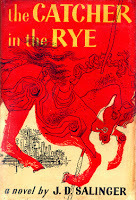 It is F. Scott Fitzgerald's birthday in a few weeks and it got me thinking: What makes a writer timeless? What makes a book a classic? Why do some books (like Gone with the Wind, Of Mice and Men, A Tale of Two Cities, Heart of Darkness) last and others quickly fade from the public consciousness?
It is F. Scott Fitzgerald's birthday in a few weeks and it got me thinking: What makes a writer timeless? What makes a book a classic? Why do some books (like Gone with the Wind, Of Mice and Men, A Tale of Two Cities, Heart of Darkness) last and others quickly fade from the public consciousness?And what defines a classic? Who determines which books are classics and which are fads? And what criteria do they use?
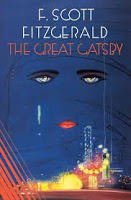 Furthermore, when can a book be determined a classic? Is, for instance, the Harry Potter series classic? Do we have to wait a generation or two before we can award a book that label? Does it have to stand some test of time? Or define some time period or era?
Furthermore, when can a book be determined a classic? Is, for instance, the Harry Potter series classic? Do we have to wait a generation or two before we can award a book that label? Does it have to stand some test of time? Or define some time period or era?What say you? This is your chance to weigh in: What makes a book a classic?
(Did you realize this post is entirely comprised of questions? Isn't that fun?)
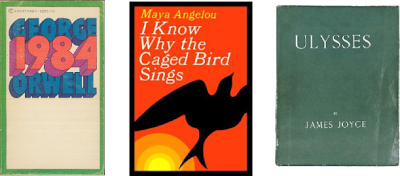
Published on August 28, 2013 08:07
August 15, 2013
English: Beautifully Befuddling
Don't get me wrong, I love the sound of the English language. It can roll off the tongue in so many rich, complex ways (i.e. compare Boston English to London English to Alabama English). I also love English's adaptation and assimilation of so many different words from so many different cultures (did you know the word "smuggler" was taken from Dutch? Or the word mattress is derived from Arabic?). And my favorite part about English? It contains the largest vocabulary of any comparable language. This makes word-loving people like me overjoyed, elated, ecstatic, even giddy. According to the Oxford Dictionary, we have (depending on how you count) 171,476 words in current use, 47,156 obsolete words, and 9,500 derivative words in the English language. That's a heap. Or a pile. Or a raging tsunami of words. However you'd like to look at it.
But, despite all its wonderful features and complexities, there are things that drive me nuts about the English language. Mostly, its inconsistencies with pronunciation and grammar.
Most of these things I never minded (or even noticed) until I learned Spanish and then started talking to Spanish-speakers who were trying to learn English. They were the ones who asked me tough questions such as, "How come through rhymes with shoe and blue?" Or, "Why is 'ph' pronounced the same as 'f?'"
I don't know the answers to these questions, but they make me thrilled/joyous/glad/pleased that English is my native language and I don't have to slog through the tedium of learning the damn thing.
 Copyright scrabblewordsolver.comLots of articles (including this one) have been written about why English is such a difficult language to master, so I won't get into that. Instead, I am going to give you my top ten list of English's most puzzling words. Enjoy, and don't forget to question the world surrounding you: what may seem normal or commonplace to you might seem totally bizarre and ridiculous to someone else.
Copyright scrabblewordsolver.comLots of articles (including this one) have been written about why English is such a difficult language to master, so I won't get into that. Instead, I am going to give you my top ten list of English's most puzzling words. Enjoy, and don't forget to question the world surrounding you: what may seem normal or commonplace to you might seem totally bizarre and ridiculous to someone else.
1. Why is the past tense of lead, led? Head, headed? Read, read?
2. Why do you lead someone up a hill, but your soldiers are made of lead? And why do you hear the wind through the trees as you wind rope? Or why was the bandage wound around the wound?
3. Why is the "gh" in through silent, but pronounced like "gh" in spaghetti? Or, better yet, why is there such a difference between through, though, and trough? Wouldn't it be better if they were spelled threw, tho, and trauf? Well, no...there is already another threw and tho is a slangy alternative to though. Harumph.
4. Related to #3, the combination of "ough" can be pronounced nine different ways, as in: "A rough-coated dough-faced, thoughtful ploughman strode through the streets of Scarborough; after falling into a slough, he coughed and hiccoughed." Gah!
5. Let's talk animals:
One ox, two oxen. One fox, two foxes.
One mouse, two mice. One doghouse, two doghouses.
One goose, two geese. One moose. Two...moose.
Also, the dove dove into the bushes.
6. This sentence: There was a row among the oarsmen about how to row.
7. And this sentence: The baker decided to desert his dessert in the desert.
8. The plural of man is men. The plural of woman is women. The plural of human is humans.
9. Colors.
Red sounds the same as read.
Blue sounds the same as blew.
Green is pronounced the same as "grene," the last part of the word gangrene.
And then there are the colors that stand alone: No words in the English language rhyme with orange, silver, or purple.
10. The verb "can" does not conjugate. It's always the same:
I can, you can, he can, she can, it can, the dog can, we can, they can...
11. BONUS: Why do a "fat chance" and a "slim chance" mean the same thing?
12. 2nd Bonus: If a vegetarian eats vegetables, what does a humanitarian eat?
Is your brain turning yet?
But, despite all its wonderful features and complexities, there are things that drive me nuts about the English language. Mostly, its inconsistencies with pronunciation and grammar.
Most of these things I never minded (or even noticed) until I learned Spanish and then started talking to Spanish-speakers who were trying to learn English. They were the ones who asked me tough questions such as, "How come through rhymes with shoe and blue?" Or, "Why is 'ph' pronounced the same as 'f?'"
I don't know the answers to these questions, but they make me thrilled/joyous/glad/pleased that English is my native language and I don't have to slog through the tedium of learning the damn thing.
 Copyright scrabblewordsolver.comLots of articles (including this one) have been written about why English is such a difficult language to master, so I won't get into that. Instead, I am going to give you my top ten list of English's most puzzling words. Enjoy, and don't forget to question the world surrounding you: what may seem normal or commonplace to you might seem totally bizarre and ridiculous to someone else.
Copyright scrabblewordsolver.comLots of articles (including this one) have been written about why English is such a difficult language to master, so I won't get into that. Instead, I am going to give you my top ten list of English's most puzzling words. Enjoy, and don't forget to question the world surrounding you: what may seem normal or commonplace to you might seem totally bizarre and ridiculous to someone else. 1. Why is the past tense of lead, led? Head, headed? Read, read?
2. Why do you lead someone up a hill, but your soldiers are made of lead? And why do you hear the wind through the trees as you wind rope? Or why was the bandage wound around the wound?
3. Why is the "gh" in through silent, but pronounced like "gh" in spaghetti? Or, better yet, why is there such a difference between through, though, and trough? Wouldn't it be better if they were spelled threw, tho, and trauf? Well, no...there is already another threw and tho is a slangy alternative to though. Harumph.
4. Related to #3, the combination of "ough" can be pronounced nine different ways, as in: "A rough-coated dough-faced, thoughtful ploughman strode through the streets of Scarborough; after falling into a slough, he coughed and hiccoughed." Gah!
5. Let's talk animals:
One ox, two oxen. One fox, two foxes.
One mouse, two mice. One doghouse, two doghouses.
One goose, two geese. One moose. Two...moose.
Also, the dove dove into the bushes.
6. This sentence: There was a row among the oarsmen about how to row.
7. And this sentence: The baker decided to desert his dessert in the desert.
8. The plural of man is men. The plural of woman is women. The plural of human is humans.
9. Colors.
Red sounds the same as read.
Blue sounds the same as blew.
Green is pronounced the same as "grene," the last part of the word gangrene.
And then there are the colors that stand alone: No words in the English language rhyme with orange, silver, or purple.
10. The verb "can" does not conjugate. It's always the same:
I can, you can, he can, she can, it can, the dog can, we can, they can...
11. BONUS: Why do a "fat chance" and a "slim chance" mean the same thing?
12. 2nd Bonus: If a vegetarian eats vegetables, what does a humanitarian eat?
Is your brain turning yet?
Published on August 15, 2013 18:00
August 7, 2013
Ten Thousand Lines, Revisited
This past July, I have been busy with my new book, novel #3 (a tale about Waldo--yes, the same one from the popular children's series--but as a paranoid schizophrenic stuck in an insane asylum. More to come on this). Because I've been so engrossed in novel #3, I had completely ignored my editing duties for novel #2, Ten Thousand Lines (for more on this project, click HERE). That needed to change. A few days ago, I got out my red pen and started up the editing process once more. It's tedious, it's dull, and it takes a lot of courage to erase lines that you've written. However, it's absolutely necessary. While I was editing, I came across the below passage. I thought it would be a good teaser for all of you (mostly because it provokes a lot of questions). I hope you enjoy it:
The poppy tea had made my thoughts heavy and my mind lethargic, but it did not carry me into dreamland. I stayed rooted in my bed, my brain very much aware that I was under the sheets of a dusty, old bed inside a dusty, old room, inside an odd, triangular building, in the center of the Dead City. I thought about my geographical position in the world and mused at how small I am.
So very small.
I put my arm around AVI. It seemed like the right thing to do. If I was small, then so was she and we could be small together. AVI stirred and stretched her body, but did not wake. I kept my chest pressed next to her back and my hand placed lightly on the soft skin of her arm. The night was so still and quiet, I could feel the blood passing under her skin. It was carrying dreams.
I imagined if I concentrated hard enough, I could feel the pulse of the dreams and let myself live within them as well. I pictured myself siphoning dreams from her skin, coaxing them out of her pores like hot days do to sweat. I stayed this way for a while, listening to AVI’s blood, feeling her dreams. Then, I let my gaze wander out the window.
The last of the pale rays had set long ago and the Dead City was dark and blue. It was impossible to tell where the sky ended and the buildings rose up. It seems to me the line between sky and earth is infinitesimally thin. I sometimes think about this when I’m looking over the sea that washes up to meet the Dead City. The sea stretches away from shore, traveling across miles and miles of open distance, until it meets with the sky at the far end of the horizon. But it is a tentative meeting—the meeting of two lips of the same mouth—and one can image a breath of air passing through the gap where they meet.
The poppy tea had made my thoughts heavy and my mind lethargic, but it did not carry me into dreamland. I stayed rooted in my bed, my brain very much aware that I was under the sheets of a dusty, old bed inside a dusty, old room, inside an odd, triangular building, in the center of the Dead City. I thought about my geographical position in the world and mused at how small I am.
So very small.
I put my arm around AVI. It seemed like the right thing to do. If I was small, then so was she and we could be small together. AVI stirred and stretched her body, but did not wake. I kept my chest pressed next to her back and my hand placed lightly on the soft skin of her arm. The night was so still and quiet, I could feel the blood passing under her skin. It was carrying dreams.
I imagined if I concentrated hard enough, I could feel the pulse of the dreams and let myself live within them as well. I pictured myself siphoning dreams from her skin, coaxing them out of her pores like hot days do to sweat. I stayed this way for a while, listening to AVI’s blood, feeling her dreams. Then, I let my gaze wander out the window.
The last of the pale rays had set long ago and the Dead City was dark and blue. It was impossible to tell where the sky ended and the buildings rose up. It seems to me the line between sky and earth is infinitesimally thin. I sometimes think about this when I’m looking over the sea that washes up to meet the Dead City. The sea stretches away from shore, traveling across miles and miles of open distance, until it meets with the sky at the far end of the horizon. But it is a tentative meeting—the meeting of two lips of the same mouth—and one can image a breath of air passing through the gap where they meet.
Published on August 07, 2013 08:04



